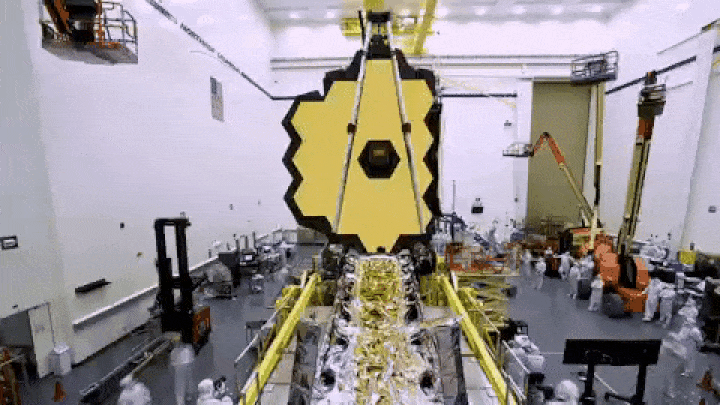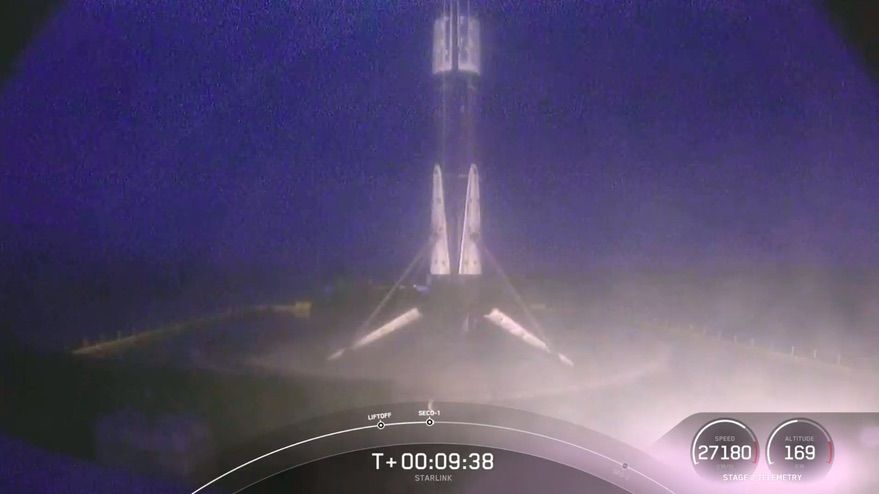Pack your bags. We’re going to another galaxy.



NASA now is targeting Oct. 312021, for the launch of the agency’s James Webb Space Telescope from French Guiana.
Webb is designed to discover and study the first stars and galaxies that formed in the early Universe. To see these faint objects, it must be able to detect things that are ten billion times as faint as the faintest stars visible without a telescope. This is 10 to 100 times fainter than Hubble can see.
The successor to Hubble is almost ready for launch. It’s really coming this year, too!

WASHINGTON — A Falcon 9 launched another set of Starlink satellites March 14, with the rocket’s first stage setting a record with its ninth launch and landing.
The Falcon 9 lifted off from Launch Complex 39A at the Kennedy Space Center at 6:01 a.m. Eastern. The upper stage deployed its payload of 60 Starlink satellites into orbit 65 minutes later, bringing the size of the broadband internet constellation to 1260 satellites.
The launch was the eighth for the Falcon 9 this year, and took place a little more than 72 hours after another Falcon 9 launch of Starlink satellites. Six of the eight Falcon 9 launches this year have been dedicated to Starlink, and one of the other two, the Transporter-1 dedicated rideshare flight, also carried 10 Starlink satellites.

CAMBRIDGE, Mass.—(BUSINESS WIRE)—Engineers from HyperLight, a leader in the commercialization of thin-film lithium niobate (LN) photonic integrated circuits (PICs), have achieved breakthrough voltage-bandwidth performances in integrated electro-optic modulators. The broadband electro-optic PIC could lead to orders of magnitude energy consumption reduction for next generation optical networking.
“We believe the significantly improved electro-optic modulation performance in our integrated LN platform will lead to a paradigm shift for both analog and digital ultra-high speed RF links” Tweet this
Energy consumption in optical networking for ethernet, data centers and 5G is soaring as a result of the rapidly growing data traffic. This is because of the limited performance of existing electro-optic modulators, the key element in converting data from the electrical to optical domain at high speed for optical networks. Current electro-optic modulators require extremely high radio-frequency (RF) driving voltages (5 V) as the analog bandwidth in ethernet ports approaches 100 GHz for future terabits per sec capacity transceivers. In comparison, a typical CMOS RF modulator driver delivers less than 0.5 V at such frequencies. Compound semiconductor modulator drivers can deliver voltage 1 V at significantly increased cost and energy consumption but still fall short to meet the optimum driving voltage. The limited voltage-bandwidth performance in electro-optic modulators poses a serious challenge for meeting tight power consumption requirements from network builders.


Here’s my latest video!
Papers referenced in the video:
DNA methylation GrimAge strongly predicts lifespan and healthspan:
https://pubmed.ncbi.nlm.nih.gov/30669119/
GrimAge outperforms other epigenetic clocks in the prediction of age-related clinical phenotypes and all-cause mortality:
https://pubmed.ncbi.nlm.nih.gov/33211845/
Dietary intake and blood concentrations of antioxidants and the risk of cardiovascular disease, total cancer, and all-cause mortality: a systematic review and dose-response meta-analysis of prospective studies:

Check out “How Watson Works here.”
Is it possible to live forever by using narrow AI that can perform faster and smarter than humans? Having a doctor give you the correct diagnosis and treatment plan only happens on average, 54% of the time, as the New England Journal of Medicine has pointed out. Having Watson instantly diagnose you with the correct diagnosis and treatment plan 95% of the time will become the new standard. Our crop of new personal medicine products such as continual internal diagnostics, synthetic immune systems, virtual assistants, and regenerative medicine will diagnose and stop sickness from ever occurring while constantly rebuilding and improving body and mind capabilities.
IBM has made a series of Watson computer systems so that any company can raise their industries products and services far beyond our human capability. IBM’s Watson was first featured to the public with its historic Jeopardy win over Ken Jennings and Brad Rutter the best human Jeopardy players. At the time, Watson contained 200 million pages of structured and unstructured content in a ninety server computing system with an analytical software IBM designed called DeepQA. Now, the financial markets, medicine, insurance companies, government, engineering, and customer service call centers are employing (buying) Watson is an artificial intelligence system, that can be specifically tailored to any digitized industry and quickly evolve their industries potential.

When physicists need to understand the quantum mechanics that describe how atomic clocks work, how your magnet sticks to your refrigerator or how particles flow through a superconductor, they use quantum field theories.
When they work through problems in quantum field theories, they do so in “imaginary” time, then map those simulations into real quantities. But traditionally, these simulations nearly always include uncertainties or unknown factors that could cause equation results to be “off.” So, when physicists interpret their simulation results into real quantities, these uncertainties amplify exponentially, making it difficult to have confidence that their results are as accurate as necessary.
Now, a pair of University of Michigan physicists have discovered that a set of functions called the Nevanlinna functions can tighten the interpretation step, showing that physicists may be able to overcome one of the major limitations of modern quantum simulation. The work, published in Physical Review Letters, was led by U-M physics undergraduate student Jiani Fei.
On March 122021 NASA’s Perseverance Rover continues to find safe place to deploy Mars Helicopter Ingenuity and collect Mars Samples. Rover’s latest pics from Mars show Helicopter’s shield attached to bottom of the rover. Perseverance will gather samples from Martian rocks and soil using its drill. The rover will then store the sample cores in tubes on the Martian surface. This entire process is called “sample caching”. Mars 2021 is the first mission to demonstrate sample collection on Mars. It could potentially pave the way for future missions that could collect the samples and return them to Earth for intensive laboratory analysis.
For the first flight, the helicopter will take off a few feet from the ground, hover in the air for about 20 to 30 seconds, and land. That will be a major milestone: the very first powered flight in the extremely thin atmosphere of Mars. After that, the team will attempt additional experimental flights of incrementally farther distance and greater altitude. After the helicopter completes its technology demonstration, Perseverance will continue its scientific mission.
Credit: nasa.gov, NASA/JPL-Caltech.
Source for NASA’s Mars Helicopter page: https://mars.nasa.gov/technology/helicopter/#Deployment.
#mars #perseverance #helicopter